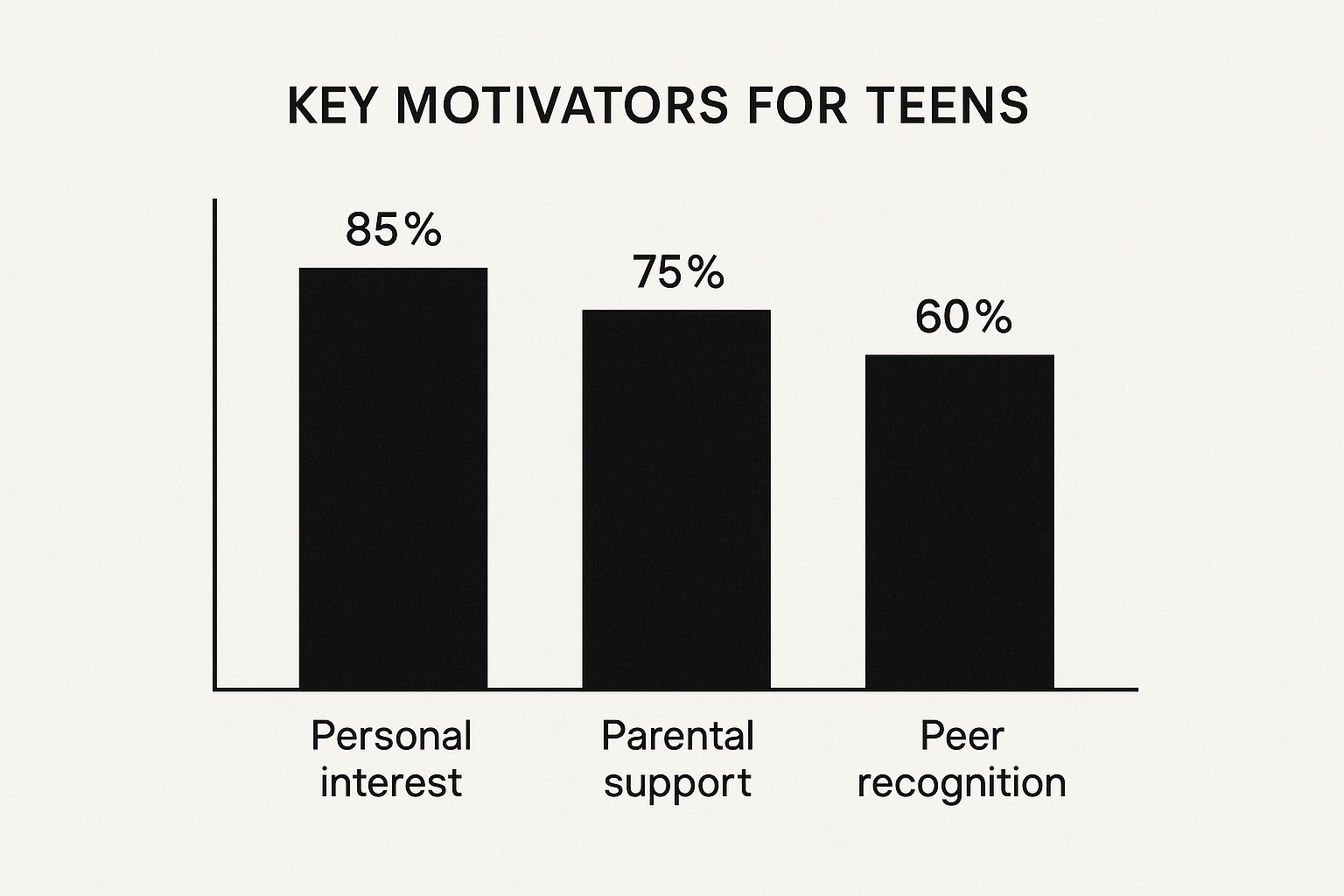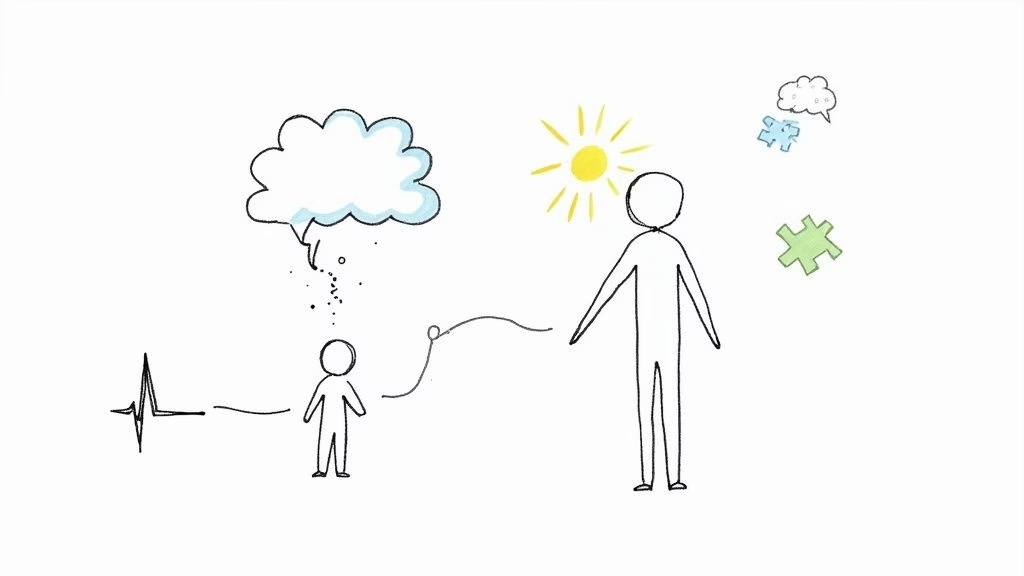Trying to figure out how to motivate a teenager can feel like you're trying to solve a puzzle with half the pieces missing. I’ve seen it time and time again with parents I work with. The first, most critical step is to completely shift your mindset: move away from blame and start leading with understanding.
It’s about recognizing that what looks like apathy is often a symptom of something much deeper—like anxiety or feeling completely overwhelmed. It’s almost never a character flaw. Making this one change in perspective is the foundation for finding strategies that actually create lasting change.
Why Your Teen Isn't Motivated (It's Not Laziness)
When a teen seems totally unmotivated, it’s so easy to jump to conclusions. "They're just being lazy." "They're defiant." I hear it all the time. But in my experience, what looks like procrastination or a couldn't-care-less attitude is usually a mask for something far more complex.
You have to remember, the teenage brain is still a major work in progress. The prefrontal cortex—the part that handles planning, impulse control, and smart decision-making—is the last to fully develop.
This means they are biologically wired to be more impulsive and way less skilled at long-term planning than we are as adults. Now, layer on top of that the intense academic pressure, constant social anxieties, and the sheer exhaustion of just growing up. It’s no wonder they disengage.
The Real Reasons Behind Procrastination
True, self-sustaining motivation almost never comes from outside pressure. It has to be sparked by something internal. Once you get that, you can start helping your teen navigate the hurdles of school and life in a way that resonates with them. Procrastination in school is often a symptom of fear—fear of failure, fear of not being good enough, or fear of the task being too overwhelming. It's an emotional regulation problem, not a time management one.

This chart really drives the point home. Personal interest is, by far, the strongest driver. This shows us we need to find ways to connect tasks to their genuine passions, rather than just leaning on rewards or punishments.
Mental Health and Its Impact on Drive
A huge factor draining teen motivation right now is the mental health crisis we're seeing. It's not just a headline; it's real. Nearly 40% of high school students report feeling persistently sad or hopeless, which directly torpedoes their energy and ability to engage.
This widespread emotional distress is a massive roadblock to their drive, both in and out of school. Some studies show truly alarming increases in self-harm and mental health emergencies among teens. According to the CDC, conditions like anxiety and depression can manifest as irritability, loss of interest, and difficulty concentrating—all of which look a lot like a lack of motivation. It's essential to understand the scale of what they're up against.
Before jumping to conclusions about your teen's behavior, it's helpful to check your own assumptions. We often interpret their actions through a lens of our own adult experiences, which doesn't always match their reality.
Shifting Your Perspective From Blame to Understanding
| Common Misconception | Underlying Reality |
|---|---|
| "They're just lazy and don't want to work." | They might be overwhelmed, anxious about failing, or unsure where to start. |
| "They're addicted to their phone." | The phone can be a coping mechanism for stress, social anxiety, or boredom. |
| "They don't care about their future." | They often care deeply but feel paralyzed by the pressure and expectations. |
| "If I just push them harder, they'll respond." | External pressure often leads to more resistance and shutdown. |
Seeing their behavior through this new lens—one of empathy—can completely change how you approach the conversation and, ultimately, the outcome.
To truly help a teenager, we have to look past the behavior and ask what’s driving it. Is it anxiety about failing a test? Fear of not fitting in? Or are they just feeling completely buried by expectations? The answer is almost never "laziness."
Sometimes, the root cause isn't just emotional or developmental. It can be physiological. Things like a poor diet can lead to brain fog caused by sugar, making it incredibly difficult to concentrate or muster up any focus.
When you reframe the problem—from seeing it as a lack of willpower to a potential underlying issue—you can approach your teen with more compassion and find strategies that actually work. This shift is everything. It’s the key to rebuilding your connection and helping them find their own genuine, lasting motivation.
Build a Foundation of Trust and Connection
Before we can even start talking about grades, chores, or procrastination, we have to talk about the relationship. Any strategy for motivating a teenager will fall flat if you don't have a solid connection. It's the bedrock. Without trust, you've got nothing.

This means shifting your role from director to collaborator. It’s about putting down the lecture notes and picking up some genuine curiosity. When your teen feels like you actually see and respect them as a person, they're far more likely to listen to what you have to say.
The Power of Active Listening
Active listening isn’t just waiting for your turn to talk. It's about tuning in to what your teen is really saying—and just as importantly, what they're not. It means noticing their tone, their body language, and the feelings simmering just beneath the surface of their words.
Let’s say your teen slams their book shut and says, "I don't even care about this stupid history project." Your gut reaction might be to jump in with logic and consequences. But what if you paused?
Instead of: "You have to care! Your grade depends on it."
Try: "It sounds like you're really frustrated with this project. What's the most annoying part about it?"
That simple switch changes everything. You’re not dismissing their feelings; you're validating them. And that opens the door for a real conversation. More often than not, "I don't care" is a mask for "I'm totally overwhelmed" or "I'm terrified I'm going to fail."
Creating a Safe Space for Failure
Your home needs to be a place where it's okay to mess up. If your teen is petrified of disappointing you, they'll stop taking risks. They'll avoid the hard stuff altogether. True motivation can't survive in an environment ruled by a fear of failure.
When they bomb a test or struggle with an assignment, shift the focus from the outcome to the process.
- Ask curious questions: "What part of that test felt the trickiest?" or "What's one thing you might do differently to study next time?"
- Share your own screw-ups: Talk about a time you failed at something and what you learned. It normalizes imperfection and shows them that mistakes aren't the end of the world.
- Praise the grind: Focus on their effort and persistence. Those are the things they can actually control, unlike the final number on a report card.
Broader Influences on Teen Motivation
It's also critical to remember that your teen's motivation doesn't exist in a vacuum. It’s shaped by forces far beyond your living room. The largest-ever global survey on youth well-being found that motivation is deeply connected to social and environmental pressures.
The report revealed a staggering reality: in 2021 alone, over 1.5 million young people died worldwide, which averages out to 4,500 deaths every single day. This points to the immense global pressures weighing on teen mental health. For some teens, something as basic as an unsafe road can be a real barrier to even getting to school, crushing motivation at its source. You can dig deeper into these global challenges and see what young people want for their well-being on pmnch.who.int.
By building that strong connection at home and understanding these bigger-picture contexts, you create a supportive launchpad where your teen feels safe enough to find their own reasons to try. That foundation of trust is the most powerful tool you have.
Help Teens Find Their Own Reasons to Care
It’s tempting to use rewards and punishments to get a teen moving. A bribe might get a room cleaned today, but it’s a short-term fix. It won't build the internal fire they need to tackle tomorrow's challenges on their own.
Real, lasting motivation isn't something we can just hand to our teens. It has to come from within them.
This is what we call intrinsic motivation—the drive to do something because it feels meaningful, interesting, or personally satisfying. Leaning too heavily on external pressures like threats or rewards actually kills this internal drive. It teaches them to perform for a prize, not for the genuine satisfaction of learning or achieving something for themselves.
From Control to Connection
So, how do we help them tap into that inner drive? It starts with connecting their daily tasks to their world, not just ours. A letter grade can feel abstract and just adds another layer of stress. But when we can tie their effort to something they genuinely value, their engagement can completely change.
A grade is just a performance metric. It doesn't inspire passion or deep learning. The real win is fostering a sense of ownership, where teens engage with their work because they see how it connects to their own lives and goals.
Think about it. If your teen is dragging their feet on a writing assignment, telling them to "just get it done" only makes it feel like more of a chore. But what if you helped them connect it to something they actually like? Maybe they could write about the storyline of their favorite video game, or analyze a cause they feel strongly about. Suddenly, the task shifts from a burden to a chance for them to express who they are.
Building the Three Pillars of Motivation
To really cultivate this internal drive, you need to focus on three core psychological needs: autonomy, mastery, and purpose. When a teen feels like these needs are being met, their motivation starts to build on its own.
-
Autonomy (The Need for Control): Give them choices. Instead of telling them exactly how and when to study, offer options. "Do you want to knock out math first, or start with history?" This small shift gives them a sense of control over their own life and cuts down on the power struggles.
-
Mastery (The Need to Get Better): Help them see their own progress. Shift the focus from the final grade to the effort and small improvements along the way. Acknowledge how they stuck with a tough problem, improved a specific skill, or didn't give up when they got frustrated.
-
Purpose (The Need to Matter): Help them see the bigger picture. This could mean exploring how a boring school subject actually connects to a career they're curious about. It might look like volunteering for a cause they believe in, or even just helping them understand how their chores contribute to making the whole family's life better.
Things like hobbies, a part-time job, or volunteer work are fantastic ways for teens to figure out what actually lights them up. These aren't just resume-builders; they're discovery labs for finding out who they are.
If you're looking for more ways to spark that internal fire, check out our additional tips on how to find motivation for more ideas you can explore with your teen.
Ultimately, our job is to be less of a manager and more of a guide. We're here to help them connect the dots between the things they have to do and the person they're becoming.
Tackle School Stress and Procrastination Head-On
For so many parents, the daily tug-of-war over homework is exhausting. If you feel like you've become the "homework police" instead of a parent, it’s a sign that the current approach isn’t working. The constant nagging doesn't just fall on deaf ears; it slowly chips away at your connection with your teen.

Here's something I’ve learned from years of working with teens: procrastination is almost never about laziness. It’s a defense mechanism. It’s what happens when they feel completely overwhelmed, anxious about not measuring up, or just have no idea where to even start.
The real shift happens when you move from being a taskmaster to a supportive coach. That's how you help them build skills that will stick with them long after they've left your house.
From Conflict to Collaboration
Instead of the dreaded, "Is your homework done yet?" try a different angle. Sit down with them for a few minutes and shift into planning mode. The goal here isn't to do the work for them but to help them break down what feels like a mountain into small, manageable steps.
Let's take a massive history paper. It's overwhelming. But what if it looked like this instead?
- Step 1: Just choose a topic by Tuesday.
- Step 2: Find five good sources online by Thursday.
- Step 3: Over the weekend, only worry about writing the outline.
Suddenly, that intimidating project becomes a series of small, achievable wins. It’s about turning a giant mountain into a few small hills they can climb one at a time. For a deeper dive, our guide on how to stop procrastinating has more practical strategies you can use tonight.
Creating an Environment for Focus
Where your teen works really does matter. Team up with them to create a designated study zone that’s free from the usual distractions. It doesn’t need to be a fancy home office—a quiet corner of the living room can work—but it should be a spot their brain associates with focus. Get their input on what they need and set some ground rules for phone use during study time.
Another game-changer is introducing structured work sessions. I’m a huge fan of the Pomodoro Technique; it’s simple but incredibly effective.
- Set a timer for 25 minutes and they focus on just one thing. No multitasking.
- When the timer dings, they take a 5-minute break. They can stretch, grab a snack, or check their phone.
- After four of these cycles, they get a longer break, like 15-30 minutes.
This method trains the brain to work in short, intense bursts, which makes homework feel a lot less like a never-ending slog.
The secret to motivation is helping teens see how their schoolwork today connects to a future they’re actually excited about. If school feels totally disconnected from real life, they’re going to check out.
This isn't just a hunch; the data backs it up. A 2022 OECD PISA survey revealed that a staggering 39% of 15-year-olds have no clear career goals. That number has doubled in less than a decade. When a teen can’t picture where they’re headed, it's pretty hard to convince them that algebra or chemistry has any real point.
A great way to combat this stress and lack of focus is through movement and mindfulness. For teens who aren't into team sports, learning how to start a yoga practice at home can be a fantastic, private way for them to build the focus and calm they need to navigate school and life.
Essential Mental Health Resources for Parents
Motivation and mental health are deeply connected. When a teen is grappling with anxiety, depression, or just overwhelming stress, their ability to show up for school, hobbies, and even family life can disappear. If you're wondering how to motivate a teen who seems totally disengaged, recognizing this link is the first, most critical step.

Sometimes, that lack of drive you're seeing isn't a choice—it's a symptom. Things like procrastination and apathy can be the outward signs of a tough internal battle. One of the most powerful things you can do is create a safe space for them to talk and know exactly where to turn when professional help is needed.
Starting the Conversation
Bringing up mental health can feel like walking on eggshells, especially with a teen who's already resistant. The key is to approach it with curiosity, not accusation.
Instead of hitting them with, "You seem depressed," try a softer, observation-based opening. Something like, "I've noticed you haven't been hanging out with your friends much lately. I'm here if you ever want to talk about it." This opens the door without forcing them to walk through it. Find a calm, private moment, and make a point to listen more than you speak.
Your main job here is to create an environment where asking for help is seen as a sign of strength, not weakness. Normalizing therapy and mental health support can completely change the game for a teen who’s on the fence about getting help.
Supporting your teen also means educating yourself. The more you understand, the more stable a foundation you can provide. A great place to start is exploring practical strategies for building resilience in teens, which can give them the tools to handle life's inevitable curveballs.
Where to Find Credible Support
When it's clear that professional help is the next step, knowing where to look is crucial. You don't want to be scrambling. Here are some trusted resources that can help you and your teen find the right support:
- The National Alliance on Mental Illness (NAMI): They offer a ton of resources, from support groups to educational materials for families and individuals navigating mental health conditions.
- The Jed Foundation (JED): This organization is laser-focused on protecting emotional health and preventing suicide for teens and young adults. They have great guides for both parents and youth.
- Psychology Today's Therapist Finder: This is a fantastic, practical tool. You can search for qualified therapists in your area and filter by specialists in adolescent psychology, specific insurance plans, and more.
- The American Academy of Child and Adolescent Psychiatry (AACAP): Provides a "Facts for Families" guide series on a wide range of topics, from depression to screen time, offering evidence-based information.
- The Trevor Project: Offers crisis intervention and suicide prevention services to LGBTQ young people under 25.
Your role isn't to be your teen's therapist. It's to be their advocate and their rock. By taking the stigma out of getting help and connecting them with the right resources, you empower them to take charge of their own well-being. And that, right there, is the ultimate foundation for lasting motivation.
Frequently Asked Questions About Teen Motivation
Navigating the teenage years is full of questions, especially when motivation seems to have gone missing. I get these questions from parents all the time, so let's walk through some of the most common challenges and how to handle them.
What If My Teen Is Completely Apathetic?
When a teen says they don't care about anything, it’s rarely the whole truth. That apathy you're seeing is often a defense mechanism—a shield they're using to hide feeling overwhelmed, anxious, or terrified of failing.
Trying to force the issue with lectures about grades or chores will just make them retreat further. The real first step is to rebuild the connection, not demand performance. Start small. Talk about a show they're watching, their friends, or something funny that happened in your day. The goal isn't to fix them; it's just to open the lines of communication again.
However, if the apathy is deep and persistent, it can be a sign of something more serious like depression. In that case, don't hesitate to reach out to a professional for guidance.
Persistent apathy is often a symptom, not the problem itself. It's a signal that your teen might be struggling with something deeper than a simple lack of motivation. Addressing the root cause—be it anxiety, depression, or feeling overwhelmed—is the only way to help them re-engage.
How Can I Motivate My Teen Without Nagging or Bribes?
This is the big one. The short-term fixes of nagging and bribing almost always backfire. Bribes teach kids to work for a prize, not for the feeling of accomplishment. Nagging just creates a wall of resentment and teaches them to tune you out.
The better way is to tap into their own internal drive. It takes more patience, but the results last a lifetime.
- Hand Over Some Control: Power struggles are exhausting. Instead of demanding they study right now, offer a choice. "Would you rather get your homework done before dinner or after?" It’s a small shift, but it gives them a sense of autonomy and makes them part of the solution.
- Connect Effort to Their Goals: Ditch the "If you get a B, I'll give you $50" model. Instead, link the task to something they actually want. "I know you're saving up for that new gaming system. Let's figure out a plan for your chores that helps you get there faster." Or, "Getting your driver's license is a huge step. Let's look at what you need to do in math to make that a reality."
This approach helps them build intrinsic motivation, which is the engine that will drive them long after they've left home.
What If My Teen's Friends Are a Negative Influence?
Forbidding a friendship is like throwing gasoline on a fire. It usually makes that friend seem more exciting and forbidden, pushing your teen away from you and closer to them.
A much better approach is to play the long game. Focus on making your relationship with your teen so strong that your voice is still the one they trust and value most.
Start by opening your home to their friends. You don't have to be the "cool parent," just be welcoming. This gives you a chance to see the dynamic for yourself without snooping or interrogating. You learn a lot just by observing.
At the same time, create opportunities for them to meet new people. Encourage them to try a new sport, join a club at school, or find a volunteer gig related to their interests. You're not forcing them to ditch their old friends; you're just expanding their world and letting more positive influences in naturally.
At Andrew Petrillo Life Coaching, I work one-on-one with teens and young adults who are stuck. Whether it's procrastination, academic stress, or a total lack of motivation, I help them build practical strategies for setting goals, managing their time, and developing real resilience. If you're ready to see your teen find their confidence again, learn more about how we can help at andrewpetrillolifecoaching.com.



















